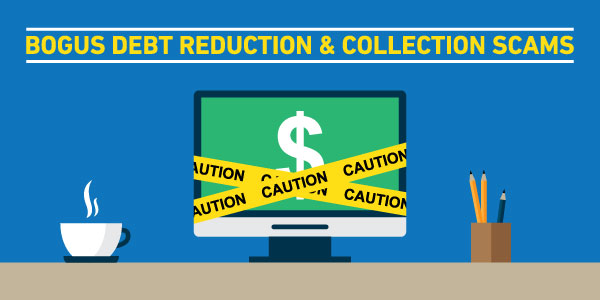Small Business Matters is written and managed by the Experian Small Business team. Subscribe for business credit education, expert advice, and helpful articles to build a strong knowledge of business credit so you can scale and grow your business.
Business Credit Reports & Scores

Your business has a credit score too and it can be pivotal to your success. Learn more about building strong business credit.
Read moreCustomer Testimonials

Hear what Experian small business customers have to say about our credit report subscriptions; and the difference it makes.
View TestimonialsNews & Research

Stay ahead of the curve by being informed about industry trends and policies that impact small businesses.
Read moreThe latest from our experts

Debt Collection Scams Substantial debt can be a crippling burden to a small business, which is why they are often targeted by con artists who purport they can vastly reduce or even eliminate this debt — for a fee. This type of scam has a long and checkered history — and is showing no sign of abating. In late October of 2016, Ukrainian-born Sergiy Bezrukov — aka John Butler aka Thomas Paris aka Christopher Riley — was arrested by the FBI in upstate New York and charged with mail fraud for having allegedly duped more than 100 small business owners out of more than $500,000. His alleged scheme was simple: mass-mail an offer to reduce small business debt by up to 75 percent in just six to 12 hours. The fee for his services — required upfront — was $1,250, to be sent via wire transfer to his company, Corporate Restructure, Inc. Of course, no actual services were performed. Victims were not only out their initial $1,250, but many had their credit ratings seriously damaged — or further damaged — as a result. “Bogus credit relief schemes are not all that common, but when they do pop up, they give legitimate organizations a bad name,” said Robert Tharnish, senior vice president of ABC-Amega, Inc., a debt collection agency headquartered in Buffalo, N.Y. “There are many ways to deal with commercial debt. Owners just have to do their due diligence.” Robert Ingold, CEO of Commercial Collection Corp. in Tonawanda, N.Y., agrees. “For anyone who receives a solicitation to reduce their debt — be it commercial or consumer — be skeptical. Know who you’re dealing with.” Both Tharnish and Ingold serve on the board of the International Association of Commercial Collectors, the world’s largest international trade association for commercial debt collection professionals. Ingold noted that most companies have accountants and attorneys who should immediately raise a red flag when such sketchy offers come their way. Even so, enough small business owners either don’t have outside help or ignore their paid experts’ advice, allowing scammers like Berzukov to rake in hundreds of thousands of dollars in just a few months’ time. Dealing with a bogus agency can damage already fragile credit ratings, Ingold noted. “In most cases, a company targeted by a debt reduction scammer has debt and delinquencies that have already been noted by reporting agencies like Experian. Bezrukov’s victims weren’t just out their $1,250, but they probably fell further behind in their debt payments expecting relief, and this just decreased their business credit scores even further.” “This is an industry where all you need is a phone and list,” Ingold continued. “We see the same problem on the flip side with fraudulent collection agencies. Fly-by-night collection agencies approach lenders with wild claims of collection prowess, or buy existing paper for pennies on the dollar, then start harassing debtors in violation of all established laws and ethics.” “ Both Ingold and Tharnish noted that the legal system has numerous avenues available for businesses that find themselves over their head in debt. These include: Restructuring the debt with the existing creditors. This often includes devising a monthly payment plan that leaves the business with enough capital to keep growing. Getting an SBA or private business loan. Declaring Chapter 11 or Chapter 13 bankruptcy, which allow businesses to discharge many of their obligations and still keep their doors open. Both experts also emphasized the need for business owners to perform due diligence before hiring any debt reduction or collection agency to work on their behalf. “Ask to see their license. Their certification. Check with the Better Business Bureau,” Tharnish advised. “Also demand references. Ask, ‘Have you done business with anyone I know?’ If an agency can’t provide references, just walk away.” “When confronted with an amazing business solicitation, just remember the old saying,” Tharnish concluded. “If it sounds too good to be true, it probably is.”

A Bank of America survey reveals similarities and differences in how women and men view the small businesses they own.

On June 23, 2016, voters in the United Kingdom voted 52 to 48 percent to leave the European Union, the 28-member organization of which it had been a part since the early 1970s. Immediately, the value of the British pound plummeted. Stock markets tumbled worldwide. Financial experts began to warn of an impending European recession.

In just one week, Augmented Reality (AR) proved itself to be the Next Big Thing in popular entertainment. Within days of Niantic Labs release of Pokémon Go, in which players "hunt" and "capture" fantastical creatures using their smartphone cameras, tens of millions of Americans have become hooked on the game. According to media reports, the app has already been installed on twice as many phones as Tinder™, is used twice as much as Snapchat, and is surpassing the all-powerful Twitter in its number of daily active users. The skyrocketing value of parent company Nintendo's stock price has provided further testament to the game's perceived long-term stamina. Beyond its nostalgia value — the game is based on the popular Japanese cartoon and videogame series from the 1990s — Pokémon Go is winning over hearts, minds and dollars due to its artful blending of fantasy game play and real-world locations. To play the game, participants must move through the physical world, often traveling many blocks or even miles in search of their elusive digital prey. Such material engagement — and the physical exertion required to complete many of the quests — is a far cry from the sedentary "couch potato" stereotype so long associated with video-gaming. Shops, restaurants and other commercial operations who find themselves near one of the game's many "Pokéstops"(virtual pit stops) and "gyms" (digital combat arenas) are seeing a marked uptick in foot traffic. Many stores are actively advertising via social media their proximity to game elements and the Pokémon that players have found nearby. Chicago's famed Art Institute received wide coverage for their boasting of various Pokémon found within their hallowed galleries, complete with iPhone screen shots of cartoon monsters perched amidst the Renoirs and Chagalls.

A lot of small business owners pay attention to their personal credit score, unfortunately, they don’t pay attention to their business’s credit score.

An understanding of your business’s value can be good for the future success of the company, as well as your financial well-being.

Learn the common traits of entrepreneurs, and some popular reasons why they go into business for themselves.

Get quick tips to help keep the positive cash flow needed to run and grow your business.

Follow a few helpful guidelines when preparing tax documents, to lessen the liklihood of IRS scrutiny.



